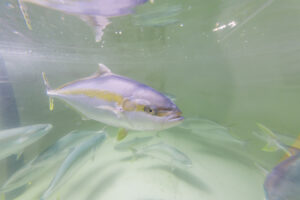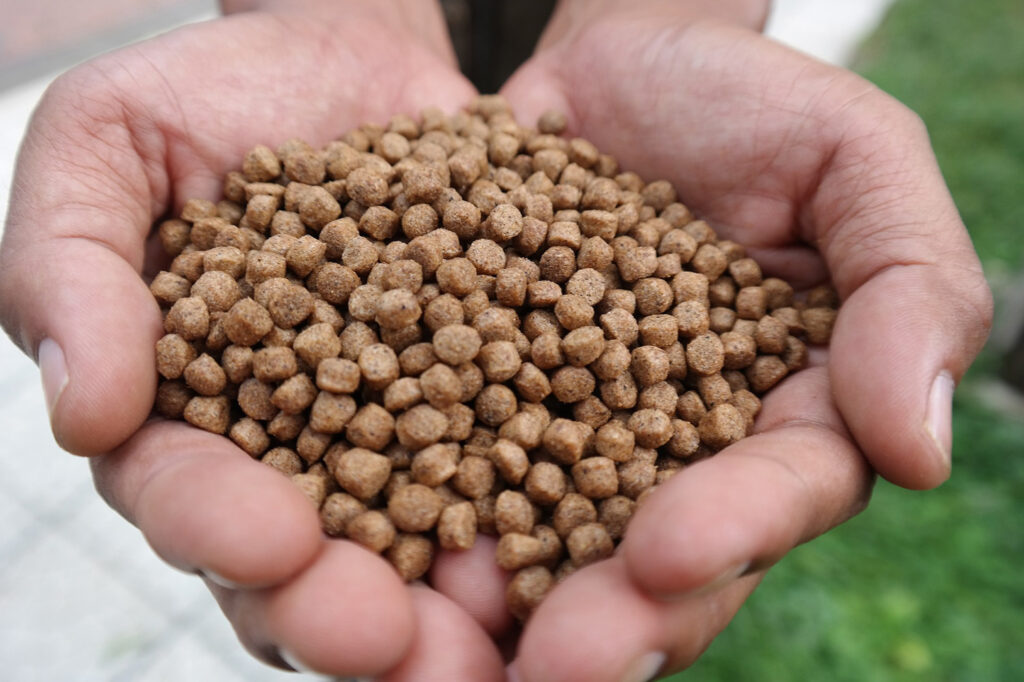BAP Spotlight Story: The Kingfish Company
This BAP spotlight story features The Kingfish Company, the world’s first BAP-certified land-based farm. The Kingfish Company produces Dutch Yellowtail and is based in the Netherlands. The following questions were answered by Sander Ruizeveld de Winter, Head of Hatchery.
What inspired you to become involved in the seafood industry?
As a child I was fond of farming, animals and water. I was busy with pet animals, boats, fishing, aquaria and digging ponds in my parents’ garden. When choosing a university education, these things came together at the University of Wageningen with a bachelor’s in animal husbandry and a master’s in aquaculture and fisheries. There I came to know recirculating aquaculture systems (RAS), and I built my first system. In my dorm room, I had an 800-liter freshwater RAS system for tilapia. Although the fish did well, the high humidity in the room caused my computer to malfunction, so the experiment was short lived. But the interest was triggered to pursue this in a professional career.
Tell us a little about your company. History, species farmed, etc.
The basic ideas for what eventually became “The Kingfish Company” started somewhere in 2008-10 by one of our founders; Kees Kloet. The first research and experiments with Seriola Lalandi in the Netherlands were conducted during those years by him in collaboration with the University of Wageningen. It led to a pilot plant that ran from 2011 to 2014, where the basis for a recirculating system for Kingfish was developed and tested.
These experiments led to a collaboration between Kees Kloet, Ohad Maiman and Hans den Bieman in 2015, and eventually to the founding of Kingfish Zeeland BV in 2016, at what moment I joined. Up until 2016, the company was just a powerpoint presentation, an excel sheet and some broodstock fish.

Reproduction of Kingfish had not been done in Europe yet, so there was something to figure out. When I joined in 2016, the broodstock were spawning for the first time ever, and although we worked hard, no larvae remained alive that year. A new and better hatchery was built during the winter of 2016-17 and in late spring we started making our first fingerlings.
During the summer of 2016 the basis for the core of our crew was formed. The team was built around extreme enthusiasts for fish and believers in RAS. The ability to work with dedicated and enthusiastic people, people with a “can do” attitude and a firm belief that we are on the right path has motivated us all to step up and push the company toward success. Production grew, and gradually “Kingfish Zeeland BV” transformed into “The Kingfish Company” it currently is.
How is your company involved in the local community?
As the Zeeland area of the Netherlands has a long history of fishing and fish trading, B to B relationships have been easily established. To process our first harvested fish in 2018, the availability of an old fish/lobster auction was very convenient and throughout the years lots of relationships with local companies have been developed. Ranging from sandwiches for lunch by the local grocery shops, to shipping our fish all through Europe by a local trucking company.
Larger local contractors have helped us with construction, electrics, and automation, but also collaborations with “That one guy that rents himself with an

excavator” or “That diver that lives in the first house in the village” have helped us enormously to move the company forward. In the meantime, we do need to get the local football team some new shirts, because the name and logo are outdated and not only Yellowtail Kingfish has a steep growth curve.
Why did your company choose to become BAP certified? How has it improved your business?
We were the world’s first recirculating aquaculture system (RAS) to earn Best Aquaculture Practices (BAP) certification in 2018– and we continue to partner with BAP to achieve more “firsts” like becoming the first farm in Europe to complete a pilot of BAP’s Raised Without Antibiotics Standard.
As innovators, it makes sense for us to collaborate with experts like BAP who are gunning for the same goal: advancing responsible seafood practices. They help us see our blindspots and think together with us with the same ambition. We’re on a mission to the perfect fish, together. Working with BAP has pushed us to improve in areas where we were unaware improvements were needed. Through BAP audits, we realized that we do not yet know all potential risks and working together with the auditors has resulted in improved practices.

Why do you love working in aquaculture?
The love for this industry developed because it gave me the ability to turn personal interest into a career. The possibility to turn a hobby into a profession is one of the most joyful and rewarding ways to earn an income. At the same time the development of “The Kingfish Company” has been one of pioneering; figuring things out as you go along, and this fits well with me. It provided the opportunity to do something that has not been done before which when it turns out successful is enormously rewarding. That I was able to do this with colleagues that share the passion for fish and also have the drive to work hard to build something new is enormously rewarding.




